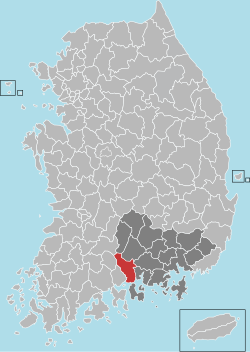world.wikisort.org - South_Korea
Hadong County (Korean: 하동군, Hadong-gun) is a county in South Gyeongsang Province, South Korea. It is on the far-west side of the province, bordering South Jeolla Province. The county office is located at Hadeong-eup.
Hadong
하동군 | |
|---|---|
County | |
| Korean transcription(s) | |
| • Hangul | 하동군 |
| • Hanja | 河東郡 |
| • Revised Romanization | Hadong-gun |
| • McCune-Reischauer | Hadong-kun |
 Flag  Emblem of Hadong | |
 Location in South Korea | |
| Country | |
| Region | Yeongnam |
| Administrative divisions | 1 eup, 12 myeon |
| Area | |
| • Total | 675.53 km2 (260.82 sq mi) |
| Population (2003) | |
| • Total | 58,010 |
| • Density | 85.9/km2 (222/sq mi) |
| • Dialect | Gyeongsang |
History
The county of Hadong was called Dasachon (Korean: 다사촌; Hanja: 大沙县, "county of much sand") when it was a part of the Jin state, later becoming a part of Nangnoguk (Korean: 낙노국; Hanja: 樂奴國), one of twelve statelets of the Byeonhan confederacy. According to the History of the Three Kingdoms, the region was called Handasa-gun (Korean: 한다사군), then changed into Hadong-gun in 757 CE, during the reign of King Gyeongdeok of Silla. During the Goryeo dynasty, the area was known as Hadong-hyeon (Korean: 하동현). In 1414, during the reign of the Joseon-era King Taejong, it became known as Hanamhyeon (Korean: 하남현) with Namhaehyeon (Korean: 남해현). It was raised to the status of Hadongdohobu (Korean: 하동도호부) in 1740, in the thirtieth year of King Sukjong's reign.[1] During the Korean War the region was the site of a North Korean attack on US Army forces, the Hadong Ambush.
- 1702: Agyang-myeon (악양면, 岳陽面) added to Hadong-gun
- April 1, 1914: Seo-myeon (Korean: 서면) and Geumyang-myeon (Korean: 금양면) added
- January 1, 1915: Part of Seomjin-ri (Korean: 섬진리), Daap-myeon (Korean: 다압면), Gwangyang-gun (광양군, 光陽郡), South Jeolla Province added
- 1917: Naehoengbo-myeon (Korean: 내횡보면) renamed to Hoengcheon-myeon (Korean: 횡천면); Deokyang-myeon (Korean: 덕양면) renamed to Jingyo-myeon (Korean: 진교면)
- January 1, 1933: Geumyang-myeon (Korean: 금양면) was abolished and incorporated into Jingyo-myeon (Korean: 진교면) and Geumnam-myeon (Korean: 금남면), formerly Nam-myeon (Korean: 남면)
- October 1, 1938: Hadong-myeon (Korean: 하동면) elevated to Hadong-eup (Korean: 하동읍)
Local sights and attractions
Nestled between the Seomjin River and Mount Jiri, the county is a popular destination for both domestic and foreign tourists who enjoy nature.[2] Parts of the Jirisan National Park lie within the county and form the county's notable hilly, mountainous landscape.[3]
The Ssanggyesa (Ssangye Temple) is a notable historic temple of the Jogye Order of Korean Buddhism and is a designated National Treasure.
Pak Gyeongni's 16-volume novel Land is partly set in the village of Pyeongsa-ri (Korean: 평사리; Hanja: 平沙里) in Agyang-myeon, Hadong County. A replica of the fictional Choi family's home was built there to commemorate the author's legacy.[2][4]
Green tea
Hadong has been famous for its green tea since the Silla era, when an envoy brought green tea seeds from the Tang Empire to be planted locally.[2] The local government has historically promoted this as a major local attraction, including sponsoring a tourism advertisement that aired on CNN in 2007.[5] The annual "wild tea" festival, lasting 25 days, takes place during May and June.[2][3]
Development
While much of Korea has experienced an explosion of industrial development, Hadong remains a destination for those who wish to escape the bustle of city living.[original research?] However, a lack of activity in the industrial sector has left the government with little incentive to expanding the sometimes inadequate existing road infrastructure.[original research?] A petition for the allocation of funds for new road construction was signed by a number of Hadong residents.[6]
Former South Korean president Lee Myung-bak has recently[when?] announced plans for the construction of a Gyeongsangnam-do leisure resort palace in Hadong.[7]
Notable people
- Jeong Gi-ryong
- Yi Byeong-ju, a novelist, journalist, and reporter
- Jeong Ho-seung
- Kang Man-soo
- Jeong Gongchae, who won the 1960 Contemporary Literature (Hyundae Munhak) Award for poetry for "Coal" (石炭) and "Freedom" (自由)[8]
Schools
- High schools
-
- Middle schools
- Agyang Middle School
Twin towns – sister cities
Hadong is twinned with:
 Anyang, South Korea
Anyang, South Korea Gwangyang, South Korea
Gwangyang, South Korea Geoje, South Korea
Geoje, South Korea Seongdong-gu, South Korea
Seongdong-gu, South Korea Haeundae-gu, South Korea
Haeundae-gu, South Korea Zhangqiu, China
Zhangqiu, China Ya'an, China
Ya'an, China Zhangjiajie, China
Zhangjiajie, China
References
- Official website http://www.hadong.go.kr/e/main/frame.asp?test=/e/01/01_02.asp?m=m1 Archived 2016-03-04 at the Wayback Machine
- "Green Tea, Nature and Market at Hadong". The Korea Times. 2008-03-13.
- "Asia Society Korea Travel Series 4 – Hadong County". Asia Society. Retrieved 2021-03-05.
- "A statue of Pak Kyong-ni to be set up at Toji Foundation". The Dong-a Ilbo. 2018-05-03.
- http://www.hadong.go.kr/e/main/frame.asp?test=/e/01/01_02.asp?m=m1%5B%5D
- 하동군 국도 19호선 4차선 확.포장 시급 Newsis 2008-01-22
- [이명박 정부 개발 핫 이슈] "동아시아 7대 경제권 도약 꿈꾼다" 2008-01-22 Retrieved 2008-01-26
- "Prix littéraires 1960". frwiki.net.
External links
- County government website Archived 2017-03-12 at the Wayback Machine
На других языках
- [en] Hadong County
[ru] Хадон
Хадо́н (кор. 하동군?, 河東郡?, Hadong-gun) — уезд в провинции Кёнсан-Намдо, Южная Корея.Другой контент может иметь иную лицензию. Перед использованием материалов сайта WikiSort.org внимательно изучите правила лицензирования конкретных элементов наполнения сайта.
WikiSort.org - проект по пересортировке и дополнению контента Википедии
